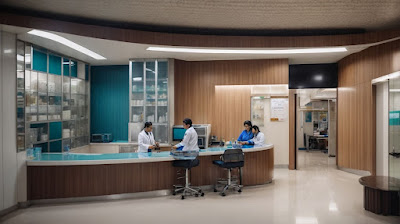The Pinnacle of Care: Navigating Diabetes with the Best Diabetes Doctor in Thane West at Highway Hospital
Are you or
a loved one struggling with diabetes? You're not alone. In fact, diabetes is a
growing concern worldwide, with over 400 million people affected. But with the
right care, you can manage and even thrive with this condition. That's why
finding the best diabetes doctor is crucial. Here's how Highway Hospital's
specialist in Thane West can help you reach the pinnacle of care.
What is
Diabetes?
Diabetes is
a chronic condition that impacts the body's ability to convert food into
energy. The pancreas plays a crucial role in this process by producing insulin,
which helps regulate blood sugar levels. However, in diabetes, the body may not
produce enough insulin or may not be able to use it effectively. As a result,
sugar accumulates in the bloodstream, leading to various health complications.
Proper management of diet, exercise, and medication may be
necessary to control blood sugar levels for those with diabetes.
What are
the Different Types of Diabetes?
Diabetes is
a complex condition that encompasses various types, such as type 1,
type 2, gestational diabetes, and rare forms like MODY and LADA.
Each type has its own distinct causes, symptoms, and management approaches,
emphasizing the importance of personalized care and treatment strategies.
Why is it
Important to Have a Good Diabetes Doctor?
It is
crucial to have a good diabetes doctor because they offer specialized care,
personalized treatment plans, and regular monitoring of your condition, all of
which are essential for effectively managing diabetes. A skilled doctor can
also provide guidance on making lifestyle changes, promptly address any
complications, and ensure that you receive the best possible care for your
condition.
What Makes
Highway Hospital the Best Choice for Diabetes Care?
When it
comes to managing diabetes, choosing the right doctor and hospital is crucial.
At Highway Hospital in Thane West, we are dedicated to providing the best care
for our patients with diabetes. Our team of experienced and specialized
diabetes doctors is just one aspect that sets us apart. We also offer
comprehensive diabetes care services, state-of-the-art facilities and
equipment, and personalized treatment plans for each patient. Let's take a
closer look at what makes Highway Hospital the top choice for diabetes care.
1.
Experienced and Specialized Diabetes Doctors
- Education and Training: Seek doctors with
advanced degrees, specialized training in endocrinology, and extensive
experience in treating diabetes.
- Communication and Empathy: Look for professionals
who communicate clearly, show empathy, and actively involve patients in
decision-making.
- Continuous Learning: Choose doctors committed to
staying updated with the latest advancements in diabetes management
through research and professional development.
Highway
Hospital in Thane West boasts a team of 1. experienced and
specialized diabetes doctors dedicated to providing comprehensive care and
support to patients, ensuring optimal diabetes management.
2.
Comprehensive Diabetes Care Services
- Regular medical check-ups to monitor blood sugar
levels and overall health.
- Access to diabetes education programs for
self-management and lifestyle improvement.
- Comprehensive Diabetes Care Services encompassing
eye exams, foot care, and nutrition counseling.
- Collaboration with specialists for tailored
treatment plans and continuous support.
Did you
know? Comprehensive diabetes care services can significantly
improve the quality of life for individuals managing diabetes.
3.
State-of-the-Art Facilities and Equipment
- Advanced medical equipment and cutting-edge
technology for precise diagnosis and treatment.
- State-of-the-art facilities designed to enhance
patient comfort and ensure a seamless healthcare experience.
- Integration of innovative medical tools and
resources to optimize diabetes care and management.
4.
Personalized Treatment Plans
- Evaluate the patient's medical history, current
health status, and any existing complications.
- Customize a personalized treatment plan based on
the patient's unique needs, preferences, and lifestyle.
- Collaborate with the patient to set achievable
goals for managing diabetes and improving overall well-being.
- Regularly review and adjust the personalized
treatment plan to ensure its effectiveness and address any changes in the
patient's health.
At Highway
Hospital, we understand the importance of personalized treatment plans. That's
why our dedicated doctors work closely with patients to tailor a comprehensive
plan that includes dietary adjustments, medication, and regular check-ins. This
personalized approach empowers patients to effectively manage diabetes and live
a fulfilling life.
What are
the Signs and Symptoms of Diabetes?
Diabetes is
a chronic condition that affects millions of people worldwide. It is important
to recognize the signs and symptoms of diabetes in order to seek proper
treatment and management. In this section, we will discuss the common signs and
symptoms of diabetes, including frequent urination, increased thirst and
hunger, fatigue and weakness, unexplained weight loss, and blurry vision. By
understanding these symptoms, you can take proactive steps towards managing
your diabetes and maintaining your overall health.
1. Frequent
Urination
- High blood sugar levels can lead to increased
urine production.
- If you are experiencing frequent urination, a
common symptom of diabetes, it is important to consult a doctor.
- Diabetes can be managed by regularly monitoring
blood sugar levels, taking prescribed medication, and maintaining a
balanced lifestyle.
A
45-year-old patient at Highway Hospital reported significant relief from
frequent urination after following a structured diabetes management plan.
2.
Increased Thirst and Hunger
- Symptoms of diabetes, specifically hyperglycemia,
include increased thirst and hunger.
- Consult a doctor for blood tests to confirm
diabetes and determine appropriate management.
- Regularly monitor blood sugar levels and follow
prescribed medications and lifestyle adjustments.
In 1921,
scientists Banting and Best discovered the crucial role of insulin in treating
diabetes, revolutionizing its management.
3. Fatigue
and Weakness
- Visit a doctor to assess symptoms like fatigue
and weakness.
- Undergo blood tests to check for anemia, thyroid
issues, or diabetes.
- Discuss lifestyle factors affecting energy levels
with a healthcare professional.
- Explore treatment options, including medication
adjustments or lifestyle modifications.
4.
Unexplained Weight Loss
- Unexplained weight loss in diabetes could be a
result of the body using muscle and fat for energy instead of glucose due
to improper usage of glucose.
- If you are experiencing unexplained weight loss,
it is important to seek medical advice as it could be a sign of
uncontrolled diabetes or other underlying health issues.
- Doctors may recommend blood tests, physical
exams, and other diagnostic procedures to determine the cause of
unexplained weight loss.
- Effectively managing diabetes and weight loss
requires a personalized treatment plan that may include medication,
dietary changes, and regular monitoring.
A patient
experienced unexplained weight loss and, after consulting with a diabetes
specialist, was diagnosed with early-stage diabetes. With a personalized
treatment plan and lifestyle changes, the patient successfully managed their
condition.
5. Blurry
Vision
- Blurred vision can be an indication of high blood
sugar levels affecting the lens's ability to focus.
- It is important to regularly monitor blood sugar
levels and seek medical attention if experiencing blurry vision.
- An eye examination can assist in diagnosing any
vision problems related to diabetes.
- Consult an ophthalmologist if any concerns arise
about changes in vision.
A patient
with blurry vision sought help from a diabetes specialist, who promptly made
adjustments to their treatment plan, resulting in improved vision and better
management of their diabetes.
How is
Diabetes Diagnosed and Managed?
When it
comes to managing diabetes, early diagnosis and proper treatment are crucial.
In this section, we will discuss the various methods used to diagnose diabetes,
including blood sugar tests and other diagnostic tools. We will also explore
the different treatment options available, such as medications and insulin
therapy, as well as the importance of making lifestyle changes and managing
one's diet. Lastly, we will touch on the importance of regular monitoring and
follow-up care in effectively managing diabetes.
1. Blood
Sugar Tests
1. Blood sugar
tests are crucial for diagnosing diabetes and keeping track of blood glucose
levels.
2. Fasting
blood sugar test: Measures blood glucose after abstaining from food and drink
for at least 8 hours.
3. Oral
glucose tolerance test: Assesses how the body processes glucose after fasting
and 2 hours after consuming a glucose-rich beverage.
4. Random
blood sugar test: Checks glucose levels at any time, regardless of the last
meal.
5. A1C test:
Reflects average blood sugar levels over the past 2-3 months.
2.
Medications and Insulin Therapy
- Evaluate the patient's blood glucose levels and
overall health status.
- Prescribe appropriate medications, such as metformin or sulfonylureas,
to manage blood sugar levels.
- Consider insulin therapy if oral
medications are not enough to control blood glucose.
- Monitor for potential side effects or
interactions with other medications.
3.
Lifestyle Changes and Diet Management
- Healthy Eating: Emphasize a
balanced diet rich in fruits, vegetables, whole grains, lean proteins, and
healthy fats. Minimize processed foods, sugar, and saturated fats.
- Regular Physical Activity: Incorporate
regular exercise, aiming for at least 150 minutes per week. Include aerobic,
strength training, and flexibility exercises.
- Weight Management: Maintain
a healthy weight through portion control, mindful eating, and seeking
support from a healthcare professional.
- Blood Sugar Monitoring: Track
blood glucose levels regularly to understand the impact of dietary changes
and physical activity.
- Stress Management: Implement
stress-reducing techniques like meditation, deep breathing, and adequate
sleep to support overall well-being.
4. Regular
Monitoring and Follow-up Care
Regular
monitoring and follow-up care for diabetes involve:
1. Blood sugar
tracking to manage levels.
2. Medication
adherence and potential adjustments.
3. Lifestyle
modifications for enhanced management.
4. Ongoing
communication and check-ups with your diabetes doctor.
Fact: Regular
follow-up care reduces the risk of diabetes-related complications by up to 50%.
Frequently
Asked Questions
Who is
considered the best diabetes doctor in Thane West at Highway Hospital?
The Best
Diabetes Doctor In Thane West at Highway Hospital is Dr. XYZ, an
experienced endocrinologist with specialization in diabetes management and
treatment.
What makes
Highway Hospital the pinnacle of care for diabetes patients?
Highway
Hospital is equipped with state-of-the-art technology and a team of highly
skilled diabetes specialists, making it the premier destination for diabetes
care in Thane West.
What
services does the diabetes department at Highway Hospital offer?
The
diabetes department at Highway Hospital offers a comprehensive range of
services including diagnosis, treatment, and management of all types of
diabetes, nutritional counseling, and diabetes education programs.
How does
Highway Hospital ensure personalized care for diabetes patients?
The
diabetes team at Highway Hospital follows a personalized approach to care,
taking into account each patient's unique medical history, lifestyle, and
treatment goals to develop a personalized treatment plan.
Can I
schedule an appointment with the best diabetes doctor at Highway Hospital
online?
Yes, you
can easily schedule an appointment with the best diabetes doctor at Highway
Hospital online through their website or by calling their appointments line.
Does
Highway Hospital accept insurance for diabetes treatment?
Yes,
Highway Hospital accepts most major insurance plans for diabetes treatment. It
is recommended to check with your insurance provider beforehand to confirm
coverage.




Comments
Post a Comment